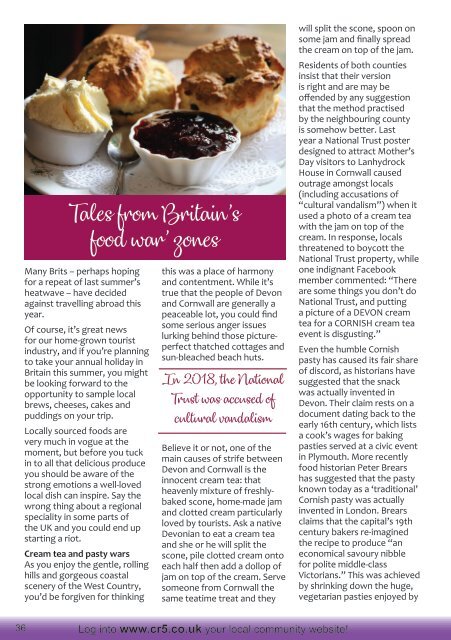CR5 Issue 169 June 2019
A local community magazine delivered free to 11,800 homes every month in the CR5 postcode. Contains local business advertising,interesting reads, Competitions, What's on in the Community and puzzles.
A local community magazine delivered free to 11,800 homes every month in the CR5 postcode.
Contains local business advertising,interesting reads, Competitions, What's on in the Community and puzzles.
You also want an ePaper? Increase the reach of your titles
YUMPU automatically turns print PDFs into web optimized ePapers that Google loves.
Tales from Britain’s<br />
food war’ zones<br />
Many Brits – perhaps hoping<br />
for a repeat of last summer’s<br />
heatwave – have decided<br />
against travelling abroad this<br />
year.<br />
Of course, it’s great news<br />
for our home-grown tourist<br />
industry, and if you’re planning<br />
to take your annual holiday in<br />
Britain this summer, you might<br />
be looking forward to the<br />
opportunity to sample local<br />
brews, cheeses, cakes and<br />
puddings on your trip.<br />
Locally sourced foods are<br />
very much in vogue at the<br />
moment, but before you tuck<br />
in to all that delicious produce<br />
you should be aware of the<br />
strong emotions a well-loved<br />
local dish can inspire. Say the<br />
wrong thing about a regional<br />
speciality in some parts of<br />
the UK and you could end up<br />
starting a riot.<br />
Cream tea and pasty wars<br />
As you enjoy the gentle, rolling<br />
hills and gorgeous coastal<br />
scenery of the West Country,<br />
you’d be forgiven for thinking<br />
this was a place of harmony<br />
and contentment. While it’s<br />
true that the people of Devon<br />
and Cornwall are generally a<br />
peaceable lot, you could find<br />
some serious anger issues<br />
lurking behind those pictureperfect<br />
thatched cottages and<br />
sun-bleached beach huts.<br />
In 2018, the National<br />
Trust was accused of<br />
cultural vandalism<br />
Believe it or not, one of the<br />
main causes of strife between<br />
Devon and Cornwall is the<br />
innocent cream tea: that<br />
heavenly mixture of freshlybaked<br />
scone, home-made jam<br />
and clotted cream particularly<br />
loved by tourists. Ask a native<br />
Devonian to eat a cream tea<br />
and she or he will split the<br />
scone, pile clotted cream onto<br />
each half then add a dollop of<br />
jam on top of the cream. Serve<br />
someone from Cornwall the<br />
same teatime treat and they<br />
will split the scone, spoon on<br />
some jam and finally spread<br />
the cream on top of the jam.<br />
Residents of both counties<br />
insist that their version<br />
is right and are may be<br />
offended by any suggestion<br />
that the method practised<br />
by the neighbouring county<br />
is somehow better. Last<br />
year a National Trust poster<br />
designed to attract Mother’s<br />
Day visitors to Lanhydrock<br />
House in Cornwall caused<br />
outrage amongst locals<br />
(including accusations of<br />
“cultural vandalism”) when it<br />
used a photo of a cream tea<br />
with the jam on top of the<br />
cream. In response, locals<br />
threatened to boycott the<br />
National Trust property, while<br />
one indignant Facebook<br />
member commented: “There<br />
are some things you don’t do<br />
National Trust, and putting<br />
a picture of a DEVON cream<br />
tea for a CORNISH cream tea<br />
event is disgusting.”<br />
Even the humble Cornish<br />
pasty has caused its fair share<br />
of discord, as historians have<br />
suggested that the snack<br />
was actually invented in<br />
Devon. Their claim rests on a<br />
document dating back to the<br />
early 16th century, which lists<br />
a cook’s wages for baking<br />
pasties served at a civic event<br />
in Plymouth. More recently<br />
food historian Peter Brears<br />
has suggested that the pasty<br />
known today as a ‘traditional’<br />
Cornish pasty was actually<br />
invented in London. Brears<br />
claims that the capital’s 19th<br />
century bakers re-imagined<br />
the recipe to produce “an<br />
economical savoury nibble<br />
for polite middle-class<br />
Victorians.” This was achieved<br />
by shrinking down the huge,<br />
vegetarian pasties enjoyed by<br />
36 Log into www.cr5.co.uk your local community website!
















